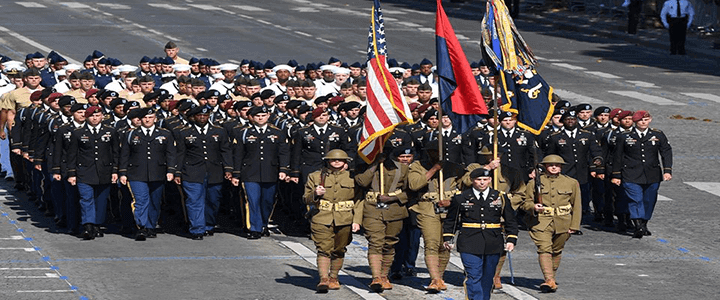As the old song says, “I love a parade.”
Apparently, the most vocal chunk of the United States does not share that view. From the reaction on social media, you’d think President Trump’s call for a grand military parade in Washington, D.C. was just a smokescreen for reinstating the draft, doubling the number of coal-fired power plants, and declaring open season on baby seals.
It might not be the best idea, but it isn’t the end of the world. Wanting a grand show of military might in the nation’s capital does not make Trump the world’s next tinhorn dictator, and the people acting like this proposal is the next sign of the impending apocalypse need to dial it back a bit.
Enough with the parade hysterics
Despite the constant online comparisons to Soviet, Chinese, and North Korean military parades, Trump’s inspiration was the French military parade he attended last summer for Bastille Day in Paris. Sure, the French have a longer tradition of parading their military down the Champs-Élysées than we do of running tanks up Pennsylvania, Independence, or Constitution Avenues, but that doesn’t make the idea wholly un-American as some have suggested.
And I thought that French President Emmanuel Macron was someone the resistance wishes Trump would be more like. So what is it? Do we just want the 30 days of paid vacation, red wine with lunch, and nationalized health care – without the parades?
The truth is, there are good reasons both to support and to oppose the parade, but the details are getting mangled.
It’s not the first u.s. military parade
The last time the nation held a parade like the one proposed was after the Gulf War in 1991, an event that drew and estimated 800,000 people to Washington to honor American service members. At the time, E.J. Dionne of the Washington Post wrote a thoughtful article on the meaning of these events. He quoted at length from Prof. Susan G. Davis, then at the University of California at San Diego and today a professor emerita at the University of Illinois at Urbana-Champaign. Dr. Davis specializes in cultural history, and said that far from being an aberration, military parades are ingrained in American history, going back to the days when participation in the military was mandatory.
But by far my favorite argument is the argument that the long line of heavy military hardware will “destroy D.C.’s streets.” I began my military career as a tanker, and have driven Abrams tanks along many miles of normal asphalt roads and never once saw any of them torn up. In fact, because tank treads are designed to spread weight evenly, an M1A2 Abrams tank, at only 15.5 pounds per square inch, puts less pressure on the ground beneath it than a horse.
Reports today seize on one snippet from the 1991 parade, held on an 85-degree day. Washington Post reporter Mary Jordan’s front-page story included the passage “Constitution Avenue took a pounding from the 67-ton M1A1 tanks and the 30-ton Bradley Fighting Vehicles. The treads of the heavy machinery left deep marks in the asphalt softened by the 85-degree heat.” From that, writers today argue that the streets were torn up.
But Jordan was also part of a separate story that appeared a few days later and reported the (disappointing for some) reality.
The story, buried on page C4, quoted the D.C. chief engineer, Gary Burch, who said, “If you didn’t know there was a parade on Saturday, you wouldn’t notice there was anything on the roadway.” There were “surface marks” from the tank treads but Burch said “there is no indication of any damage at all.” The article said, “The surface damage was isolated and will smooth itself out after cars travel over the street for several weeks.”
The National Parks Service agreed that damage to the National Mall area was “minimal.” It’s true that a statue belonging to the Smithsonian’s Hirschorn Sculpture Garden was damaged by rocks thrown away from a landing helicopter, but we can fix that by not landing helicopters on the Mall.
Word on the street is that the Pentagon is pushing to have this parade, if it happens at all, be on Veterans Day, which this year will mark the 100th anniversary of the end of the First World War. If that’s not a good enough reason to get Senate Minority Leader Chuck Schumer (D-, N.Y.) to support this parade the way he supported holding an NYC ticker-tape parade when he thought president Obama was ending the Afghanistan war just four yaers ago, I don’t know what will.




